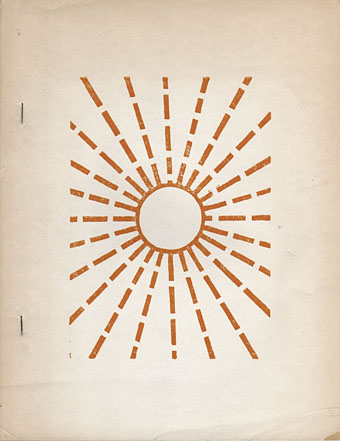Cover of Tom Veitch Magazine #1 (1970).
• RIP Tom Veitch, a writer with whom I almost created a comic-book series in the 1990s. Things didn’t work out for a variety of reasons but we had some good conversations. All the news notices focus on his writing for comics, a career which ranged from angry, political strips with Greg Irons to typical franchise fare. But he had short stories published in New Worlds magazine when it was at its peak under Michael Moorcock’s editorship, and in Quark, a short-lived paperback magazine edited by Samuel Delany & Marilyn Hacker. Veitch was also among the first 35 contributors to John Giorno’s Dial-a-Poem service when it launched in 1968, part of a select group that included John Ashbery, William Burroughs and Allen Ginsberg. Related: An interview with Tom Veitch on William Burroughs at Reality Studio.
• “I won’t deny that I thought very much about a post punk influence on it. Everybody knows that I love post punk, but I didn’t want to copy anybody.” Robert Hampson talking to Jonathan Selzer about the return of Loop.
• “What Joyce and Eliot, Ulysses and The Waste Land, had in common was a showiness, an overt ambition as well as a magpie approach to literature as assemblage.” John Self on the year 1922, “literature’s year zero”.
• At Spoon & Tamago: All of Japan’s 47 prefectures captured in expressive typography.
• At Public Domain Review: Composition (1905) by Arthur Wesley Dow, a book for art students influenced by the example of Japanese prints.
• At Wormwoodiana: Mark Valentine on the unending attempts to solve The Mystery of Edwin Drood.
• Mixes of the week: Fact Mix 846 by Ehua, and Soylent Green – No Escape by The Ephemeral Man.
• At Dennis Cooper’s: Matthew Suss presents…Joseph Cornell Day.
• At Bandcamp: A guide to Alvin Lucier.
• Loop The Loop (1980) by Young Marble Giants | Q-Loop (1995) by Basic Channel | Loop-Loop (1996) by Michael Rother


I once read Kingsley Amis and Brian Aldiss discussing the idea of the culture defining artist who in their work expresses and consequently exhausts the creative spirit of their age. Homer, Dante, Shakespeare… Joyce? These folks never herald the beginning of an age but announce its ending.
Is this too Eurocentric an idea? There have been many fine novels written since Joyce but there is also a real sense of ‘what’s the point?’ Perhaps the novel is not really the art form that speaks best about our age. As a form it seems to rest on certain assumptions about the world that maybe can no longer can be made.
I think of Ulysses as a beginning rather than an end. Its example for writers was that the novel could now encompass every aspect of human life, from the wildest fantasy to the most trivial detail, and with none of the evasions found in the novels of the 19th century. Joyce’s examination of sexuality and the body were the most notorious features but I often think of the questionnaire chapter as being a real innovation for its cosmic perspective. He’d spent most of the novel following the characters but suddenly you get a macrocosmic and microcosmic view of the world they live in. You can trace a line from that chapter to the Nouveau Roman with its emphasis on detailed description that avoids anthropomorphic metaphors.
Ulysses is like a huge space cleared in a forest where people have been stumbling around for too long in the dark. Those people may not be able to clear the same amount of space themselves but Joyce has showed them paths to regions that weren’t so visible before.